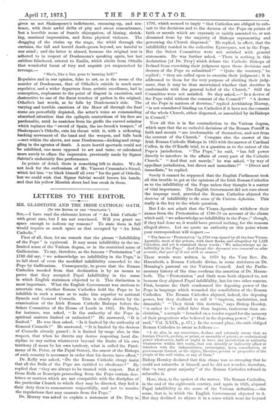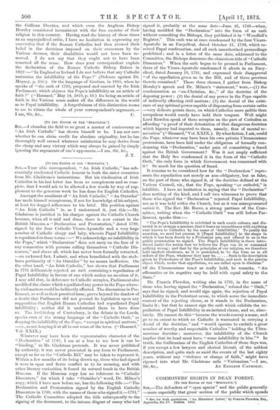LETTERS TO THE EDITOR.
MR. GLADSTONE AND THE IRISH CATHOLIC OATH.
ITO THE EDITOR OF THE "SPECTATOR."]
SIR,—I have read the elaborate letters of "An Irish Catholic" with great care, but I am not convinced. Will you grant me -apace enough to indicate my reasons? To state them in full -would require as much space as that occupied by "An Irish Catholic."
First of all, then, let me remark that the phrase "Infallibility -of the Pope" is equivocal It may mean infallibility in the un- limited sense of the Vatican dogma, or in the restricted sense of Gallicanism. To say, therefore, as the famous " Protestation " of 1789 did say, "we acknowledge no infallibility in the Pope," is to fall short of even the modified infallibility conceded to the Pope by Gallicanism. Consequently, to prove that the Roman -Catholics receded from that declaration is by no means to prove that they accepted Papal Infallibility in the sense in which English statesmen objected to it. This distinction is most important. What the English Government was anxious to ascertain was, whether Roman Catholics held the Pope to be infallible in such a sense as to make him superior to national Synods and General Councils. This is clearly shown by the examination of the Irish Roman Catholic Bishops before the Select Committee of the House of Lords in 1825. Dr. Doyle, for instance, was asked, "Is the authority of the Pope in spiritual matters limited or unlimited ?" He answered, "It is limited." He was then asked, "Is it limited by the authority of -General Councils?" He answered, "It is limited by the decrees of Councils already passed ; it is limited by usage also, in this respect, that when he directs any decree respecting local dis- cipline to any nation whatsoever beyond the limits of his own territory (I mean by his own territory, what is called the Patri- mony of St. Peter, or the Papal States), the assent of the Bishops of such country is necessary in order that his decree have effect."
Dr. Kelly was asked, "Do the Roman Catholic clergy insist that all the Bulls of the Pope are entitled to obedience?" He replied that "they are always to be treated with respect. But if those Bulls or Rescripts proceeding from the Pope contain doc- trines or matters which are not compatible with the discipline of the particular Church to which they may be directed, they feel it their duty then to remonstrate respectfully, and not to receive the regulations that may emanate from the Pone."
Dr. Murray was asked to explain a statement of Dr. Troy in 1793, which seemed to imply that Catholics are obliged to sub- mit to the decisions and to the decrees of the Pope on points of faith or morals which are expressly or tacitly assented to, or not dissented from by the majority of Bishops representing and governing the Church dispersed." He replied, in effect, that the infallibility resided in the collective Episcopate, not in the Pope.
But the Select Committee were not satisfied with general statements. He was further asked, "There is nothing in this declaration [of Dr. Troy] which debars the Catholic Bishops of Ireland from exercising their judgment upon those decisions and decrees of the Pope so submitted ?" "Quite the contrary," he replied ; "they are called upon to exercise their judgment ; it is addressed to them for the very purpose of eliciting their judg- ment, that it may be thus ascertained whether that doctrine is conformable with the general belief of the Church." Still the Committee were not satisfied. So they asked,—" Is a decree of the Pope valid without the consent of the Council ?" "A decree of the Pope in matters of doctrine," replied Archbishop Murray, "is not considered binding on Catholics if it have not the consent of the whole Church, either dispersed, or assembled by itsBishops in Council."
Now all this is in fiat contradiction to the Vatican dogma, which says that the ex cathedra decisions of the Roman Pontiff in faith and morals "are irreformable of themselves, and not from the consent of the Church." Compare also the answer of the Irish Roman Catholic Bishops in 1823 with the answer of Cardinal
Cullen, in the O'Keeffe trial, to a question as to the extent of the Pope's jurisdiction. "The Pope," he said, "has full power directly to interfere in the affairs of every part of the Catholic Church." "And that not merely," he was asked, "by way of appellant jurisdiction, but direct and immediate?" "Direct and immediate," he replied.
Surely it cannot be supposed that the English Parliament took all this trouble to get at the opinions of the Irish Roman Catholics as to the infallibility of the Pope unless they thought it a matter of vital importance. The English Government did not care about the language used, provided the Roman Catholics abjured the doctrine of infallibility in the sense of the Vatican definition. This really is the key to the whole question.
But I do not admit that the Vicars-Apostolic withdrew their names from the Protestation of 1788-79 on account of the clause which said, "we acknowledge no infallibility in the Pope ;" though, if they had done so, it would have proved nothing, for the reasons alleged above. Let me quote an authority on this point whom your correspondent will respect :—
"The famous 'Protestation' in 1788 was signed by all the four Vicars. Apostolic, most of the priests, with their flocks, and altogether by 1,525 Catholics, and yet it contained these words : We acknowledge no in- fallibility in the Pope.' And though this document was censured on other grounds, that part of it met with no censure."
These words were written in 1870 by the Very Rev. Dr. Husenbeth, a Roman Catholic divine, in some strictures on Dr. Manning's pastoral on the Vatican Council. And the Parlia- mentary history of the time confirms the assertion of Dr. Husen- beth. The " Protestation " and Oath were both objected to, not because they abjured Papal infallibility, but for two other reasons. First, because the Oath condemned the deposing power of the Pope in language which wounded the sensibilities of the Roman Catholics. The Roman Catholics abjured, indeed, the deposing power, but they declined to call it "impious, unchristian, and damnable." "They think this doctrine," says Bishop Horsley, "is rather to be called false than impious, traitorous than un- christian," a scruple "founded on a tender regard for the memory of their progenitors who believed in the deposing power." ("Han- sard," Vol. XXIX., p. 671.) In the second place, the oath obliged Roman Catholics to swear as follows :—
"I do also, in my conscience, declare and solemnly swear that no foreign Church, prelate, or priest, or assembly of priests, or ecclesiastical power whatsoever, hath or ought to have any jurisdiction or authority whatsoever within this realm, that can directly or indirectly affect or interfere with the independence, sovereignty, laws, constitution, or government thereof, or tho rights, liberties, person or properties of the people of the said realm, or any of them."
Bishop Horsley declared that this clause was so sweeping that he could not subscribe it himself, and he did not wonder, therefore, that "a very great majority" of the Roman Catholics refused to subscribe it.
Here, then, is the upshot of the matter. The Roman Catholics, in the end of the eighteenth century, and again in 1825, abjured Papal infallibility in the sense of the Vatican definition,—the sense, that is, in which the English Government objected to it. But they declined to abjure it in a sense which went far beyond
the Gallican liberties, and which even the Anglican Bishop Horsley considered inconsistent with the free exercise of their religion in this country. Having read the history of those times as an unprejudiced critic, I have no hesitation in expressing my conviction that if the Roman Catholics had then avowed their belief in the doctrines imposed on their successors by the Vatican decrees, their disabilities would not have been re- moved. I do not say that they ought not to have been removed all the same. How does your correspondent explain the declaration of the Roman Catholic Bishop Baines in 1822 :—" In England or Ireland I do not believe that any Catholic maintains the infallibility of the Pope ?" (Defence against Dr. Moysey, p. 230.) Or the language of Grattan, in 1810, when he speaks of "the oath of 1793, proposed and enacted by the Irish Parliament, which abjures the Pope's infallibility as an article of faith ?" (" Hansard," May 18, 1810, p. 19.) Its being an article of faith in the Vatican sense makes all the difference in the world as to Papal infallibility. A forgetfulness of this distinction seems to me to vitiate the whole of your correspondent's argument.—



































 Previous page
Previous page